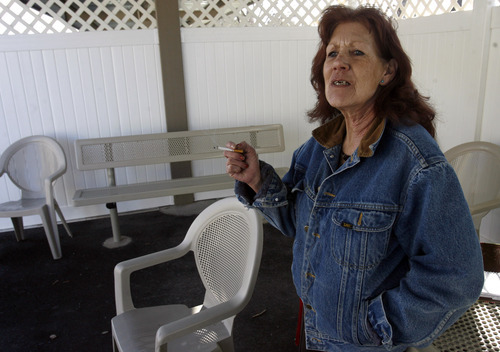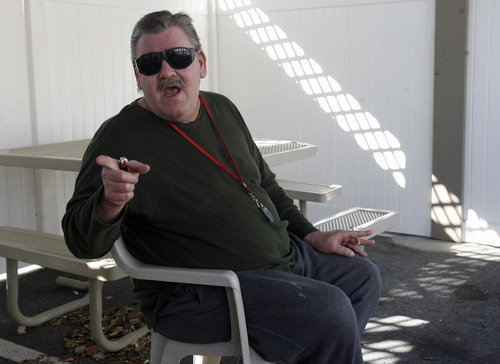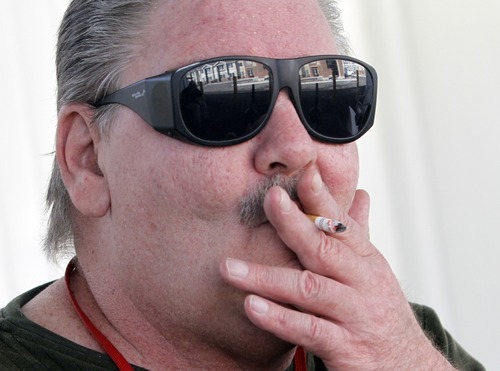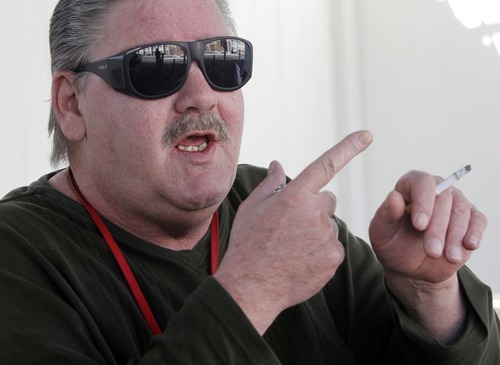This is an archived article that was published on sltrib.com in 2011, and information in the article may be outdated. It is provided only for personal research purposes and may not be reprinted.
Utah government agencies have banned smoking in offices, restaurants, bars, parks — and now inside some homes.
As part of a national movement to protect nonsmokers from secondhand smoke, some public housing authorities in Utah are banning smoking in subsidized housing projects.
Wendy Smith, a smoker and tenant of one of the newly smoke-free buildings, points to two reasons: Her 3-year-old son riding a tricycle at her feet and the yellowed blinds of her neighbor, who she said smokes indoors.
"It makes your house stink. It makes everything dirty inside," said Smith, smoking a cigarette on her front porch at Union Plaza Complex in Midvale. "It's not healthy for your kids if you're a smoker."
Salt Lake County housing authority officials say they were looking out for nonsmokers' lungs — and the bottom line — when they recently banned smoking at two properties: Union Plaza, home to 30 low-income families, and the senior housing building Kelly Benson Apartments in West Valley City.
When apartments turn over, it costs more money to remove the odors from walls, curtains and carpets, according to advocates of smoke-free policies.
And secondhand smoke is dangerous. Labeled as a known human carcinogen, secondhand smoke puts children at risk of sudden infant death syndrome, respiratory infections, ear infections and asthma. Research has shown that even brief or low levels of exposure can decrease both lung function and children's reading and math scores.
Plus, the policy may encourage smokers to quit by making it more inconvenient.
"It's for the children," said Elaine Munk, manager of Union Plaza. "It's a choice to smoke. You shouldn't make choices for other people."
She notes that she's not trying to make the tenants quit smoking — though she will direct them to quit resources if they want — but insists they smoke outside.
—
Neighbors at risk • Smoke can travel through walls, ductwork, windows and ventilation systems in multi-unit dwellings. A study published in the journal Pediatrics in January found that children who live with nonsmokers in buildings that allow indoor smoking are more likely to have increased levels of a tobacco biomarker in their blood than children living in detached homes. Banning smoking in multiunit dwellings, suggest the authors, could reduce children's exposure to the smoke.
It was wafting smoke that prompted the Provo City Housing Authority to go smoke-free in its 345 units about a decade ago. Executive Director Doug Carlson said nonsmokers were complaining about the smell.
"We really changed the policies to serve the needs of the majority," he said.
In 2009, the U.S. Department of Housing and Urban Development "strongly" urged public housing authorities to implement smoke-free housing policies. Last year, it encouraged owners of properties that rent to people who receive rental assistance to make those units smokeless as well. HUD emphasized that applicants cannot be rejected for being smokers.
Based on the letters, Salt Lake City's housing authority considered banning indoor smoking at its three public housing buildings, all for seniors. It chose not to, after surveying residents who were closely split on whether the policy should change.
"There are fewer smokers than nonsmokers. That's why I was surprised with the survey results," said Terry Feveryear, deputy director of the Housing Authority of Salt Lake City.
The more support for the policy change the better, since managing smoke-free housing can be difficult, she said. Based on experiences of trying to evict tenants from public housing, she anticipates judges would be hesitant to evict a poor person for smoking.
"It becomes a management nightmare," she said.
Still, some new Salt Lake City housing authority properties are smoke-free, including Sunrise Apartments, for formerly homeless adults, and a 70-unit senior housing project that will be built in the Guadalupe neighborhood, Feveryear said. The new building will give seniors a choice between living in a smoke-free unit or in one that allows smoking, she said.
—
'We want people to comply' • Salt Lake County's housing authority has been working toward limiting smoking since 2007. It started by encouraging residents to pledge to go smoke-free in cars and homes. Then it banned smoking at property playgrounds.
Kelly Benson Apartments opened as smoke-free in 2010, and Union Plaza changed its policy in November. When the Bud Bailey Apartments open in 2012, its 136 units for refugees, homeless youth and families, and low-income households will also be smoke-free.
Depending on how those experiments go, the county's other 1,000 units could follow, said Marni Timmerman, the housing authority's resident services manager.
But the agency doesn't want the policy to be a barrier to housing the poor, she said. The county isn't booting residents who smoke, which makes enforcing the rule challenging.
"We don't want to evict anybody for smoking, but we want people to comply," she said while on a tour of Kelly Benson, where smoke could be smelled in the hallway.
Resident Ron Boyd, 61, smokes outside and thinks tenants should be kicked out for smoking indoors. "The guy below me smokes so it comes up into my apartment. I don't think he should."
Tenant and smoker Armand Acosta, 66, disputes that secondhand smoke is "that potent." And he bristles that government has banned smoking in most public places. But he supports the policy.
"I don't have a problem coming out and having a cigarette. It's good for me because I smoke less," he said.
Apartment supervisors say they've seen an unexpected benefit: The tenants, 90 percent of whom smoke, are more social because they have to leave their rooms.
"They became more of a community by going outside and smoking," said Vanessa Shosted, property manager.
But resident Lloyd Best calls the policy "bulls—-." Smoking in a designated area outside, the 56-year-old said he smokes in his room because other residents do, too.
"You're sitting there watching a movie, you want to go outside and have a cigarette? No."
Over at Union Plaza, Smith supports the smoke-free rule. A smoker for three decades, the 45-year-old said she has cut back after learning more about secondhand smoke at a health department presentation at the complex.
While she said she has never smoked inside her home, she did smoke at the playground before the ban.
"All us girls would chitchat. We'd be smoking like chain-os," she said. Now "we don't smoke when we're playing with the baby. Not anymore anyway."
Smoke-free policies target the poor
When public housing authorities go smoke-free, the policies target the people most likely to smoke — the poor. Utah Department of Health data show that 20 percent of adults who smoke make less than $25,000 a year — compared with 6 percent of smokers who make $75,000 or more. About 27 percent of adult smokers have less than a high school education, compared with 3 percent of smokers who are college graduates. —
What about private apartments and condos?
The Utah Department of Health has been encouraging owners of privately owned apartments and condos to ban smoking, which is allowed by law. Over the past five years, about 200 complexes have done it, said Cassandra Fairclough, of the department's environmental sanitation program. While she doesn't anticipate that Utah will forbid smoking in all apartments, like some cities in California have done, she sees the bans spreading, owner by owner. "Managers are realizing that this is what tenants actually want," she said. "We get calls all the time [from people] complaining about secondhand smoke in apartments." Utah law gives them a right to protest: It considers tobacco smoke that drifts from one residential unit to another to be a "nuisance" — just like irritants from homes with noisy parties, drug activity or prostitution.
Heather May —
To get help
O Uninsured smokers can receive free prescriptions for two cessation medications through a partnership between the Utah Department of Health and Smith's pharmacies.
> health.utah.gov/clinics/











